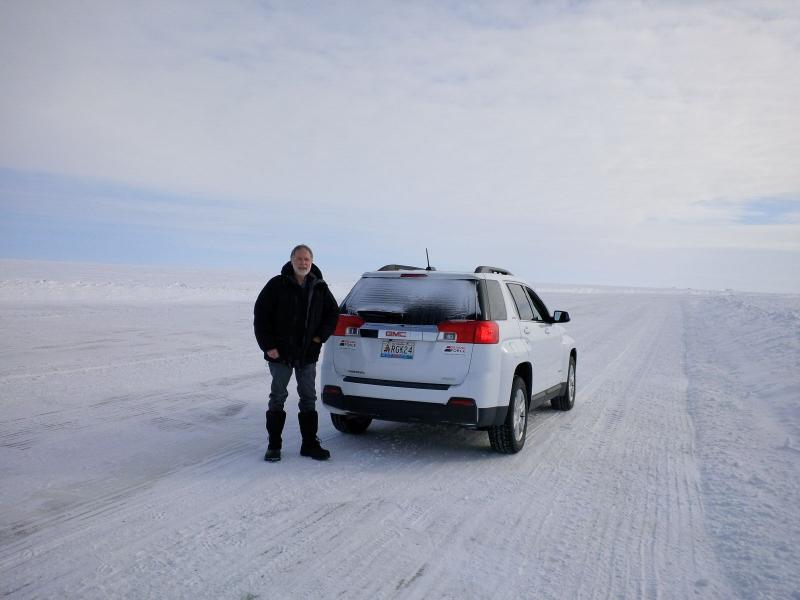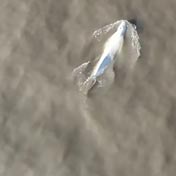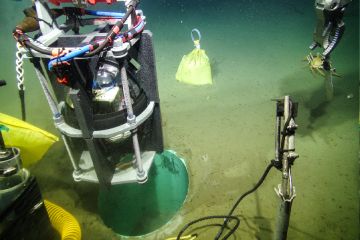Ice-road research: listening to locals on Arctic and coastal change
- Anne MacLaurin

Driving on ice roads in the far north is a normal occurrence for geographer and storm expert David Atkinson. In late April, Atkinson and colleagues drove the ice road between Inuvik and Tuktoyaktuk, and later flew up even farther to Ulukhaktok and Sachs Harbour (pop. 80 people). His purpose was to interview residents about the impacts of weather (especially storms), as he says, “who knows more about northern weather than the people most affected by it?”
Atkinson’s main research focus is how storms affect people and the environment, especially in the northern climate. Travelling in the north and connecting with communities is how Atkinson learns more about storm surges, sea level rise and the impact of melting sea ice.
Atkinson and UVic co-author, Thomas James (adjunct professor in SEOS), wrote chapter 2 of a Natural Resources Canada commissioned report Canada’s Marine Coasts in a Changing Climate—released on April 12 at the Adaption 2016 conference. Solutions to complex climate issues in the north are being discussed not just by academics but by all levels of government.
The report was a multi-year, collaborative process involving over 60 authors from academia, federal governments, and other levels of government, industry and professional organizations. The scientific assessment includes overviews of regional climate change impacts, risks and opportunities along Canada’s three marine coasts, case studies demonstrating action, and discussion of adaptation approaches.
The report synthesized over 1,300 publications into a significant and accessible resource for Canadians who want to understand how climate is changing in Canada’s coastal regions, and the potential impacts of climate change on coastal communities.
“Being asked to write a chapter for this report was a privilege,” says Atkinson. “To succeed in combating climate change we need support from all levels of government.”
Atkinson describes Chapter 2, "Dynamic Coasts in a Changing Climate", as focused on physical aspects of Canadian marine coastal environments: Pacific, Northern, and Atlantic. He says coastal zones are subjected to the influence of weather and associated waves and storm surge.
According to co-author, Thomas James, “for southern Canada, relative sea-level is projected to rise, and this will contribute to increased frequency of extreme water-level events that cause flooding, exacerbate coastal erosion, and that can damage infrastructure. Knowledge of projected sea-level changes will contribute to planning and effective adaptation for coastal communities, individuals, and industry.”
“Our work is guided and refined by the comments and observations of the residents in the area under study," Atikinson says in a recent issue of UVic knowLEDGE. "We acknowledge the efforts and expertise of people who understand and monitor the environment in a way that we can't. Essentially, they tell us what to analyze."
"I look for the link between weather events and people and then provide solutions that help them conduct their way of life,” continues Atkinson.
This was the last year for the ice road to Tuktoyaktuk, supplanted by a permanent road link that will be completed this summer. But long-established ways are changing in the north, according to Atkinson’s discussions with community residents, changes in ice conditions and weather patterns have compromised their livelihoods.
While experts from the south have lots of great ideas to help, Atkinson says, “ultimately, to be effective, any solutions and adaptations to climate change must be guided by those feeling its impact.”
Read more about David Atkinson’s research in April’s issue of knowLEDGE and in a related CBC news story.
Photos
In this story
Keywords: Arctic, climate, geography, research, environment
People: David Atkinson











